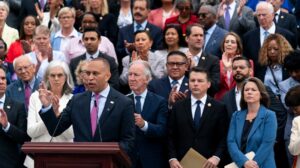
Mike Johnson is confronting what may be the most significant legislative challenge of his career. As early as this morning, the Speaker of the House plans to push the Senate-passed megabill through the House of Representatives, despite facing substantial opposition from within his own party. This opposition arises from various factions of the Republican conference, objecting to the Senate’s version of the bill, which includes deeper Medicaid cuts, increased deficit projections, and less stringent clean-energy provisions than initially anticipated.
The urgency of this legislative push is underscored by a self-imposed deadline set by former President Donald Trump, targeting completion by July 4. However, severe thunderstorms in Washington D.C. threaten to impact full attendance, complicating Johnson’s efforts. “We’ll see. I’ve got to play the cards that are dealt to me,” Johnson remarked on Tuesday, expressing his dissatisfaction with the Senate’s amendments. “And we’re working through that. … But we remain optimistic we’re going to land it at this point.”
Challenges and Opposition
Johnson faces a tight 24-to-48-hour window to persuade fiscal conservatives and Medicaid moderates to accept the Senate’s version of the bill. On Monday, he engaged in numerous calls with concerned lawmakers and caucuses, attempting to secure a path forward without altering the bill. Notably, Johnson and Senate Majority Leader John Thune have been in communication throughout much of the process, although they did not confer in the hours preceding the Senate vote, according to Thune.
The Senate bill, however, is proving to be a hard sell. Members of the House Freedom Caucus, including Representatives Chip Roy (R-Texas) and Ralph Norman (R-S.C.), criticized the Senate’s bill on Tuesday for exacerbating the deficit and diluting clean energy tax credits. Both Roy and Norman voted against the bill in the Rules Committee overnight.
Medicaid Concerns
House moderates are particularly troubled by the substantial Medicaid cuts, which Johnson has privately acknowledged could jeopardize Republican control of the House in the 2026 elections. Senator Thom Tillis (R-N.C.) delivered a speech condemning the Senate’s Medicaid provisions, echoing the concerns of many vulnerable Republicans. A significant faction of the holdouts would prefer to revise the package and return it to the Senate, rather than hastily passing the current version under a tight deadline. Norman articulated this sentiment, suggesting that the House should revert to the original bill, adjourn, and reconvene once Senate Republicans demonstrate greater seriousness.
Potential Progress and Strategic Moves
Despite these challenges, there are glimmers of progress for Johnson. Representative Nick LaLota (R-N.Y.) appeared more inclined to support the bill on Tuesday night after previously rejecting a deal related to a state-and-local tax deduction. Additionally, Representative Jeff Van Drew (R-N.J.), who had been a staunch opponent due to the Medicaid provider tax, expressed a more favorable view following a local provider tax adjustment in the wraparound amendment for New Jersey and other states.
Nevertheless, bringing the bill to the House floor remains a gamble. Many Republicans believe it would fail without further modifications. However, Johnson has a history of introducing bills without securing the necessary votes, often relying on Trump to exert pressure on dissenters.
Weather and Legislative Timing
Weather-related disruptions could further complicate the legislative timeline. On Tuesday, over 200 flights into Reagan National Airport were either canceled or delayed due to thunderstorms, according to the flight-tracking service FlightAware. Johnson indicated on Tuesday night that these travel issues might delay the House vote on the GOP megabill, which is anticipated as early as Wednesday.
Future Legislative Strategies
As the House seeks to pass the current reconciliation package without additional amendments, Johnson is hinting at future opportunities for lawmakers to incorporate their priorities into party-line packages. In a Tuesday night interview on Fox News, Johnson revealed plans for the House to pursue two more reconciliation bills during this congressional session, which concludes in 2026.
This legislative maneuvering underscores the complexities and strategic calculations involved in navigating the current political landscape. As Johnson works to marshal support for the megabill, the outcome of this legislative battle could have significant implications for the Republican Party’s legislative agenda and its prospects in upcoming elections.






